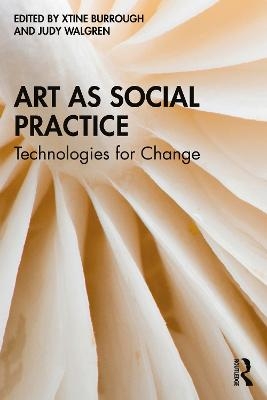
Art as Social Practice
Routledge (Verlag)
978-0-367-75846-2 (ISBN)
Suzanne Lacy’s Foreword and section introduction authors Anne Balsamo, Harrell Fletcher, Natalie Loveless, Karen Moss, and Stephanie Rothenberg present twenty-five in-depth case studies by established and emerging contemporary artists including Kim Abeles, Christopher Blay, Joseph DeLappe, Mary Beth Heffernan, Chris Johnson, Rebekah Modrak, Praba Pilar, Tabita Rezaire, Sylvain Souklaye, and collaborators Victoria Vesna and Siddharth Ramakrishnan. Artists offer firsthand insight into how they activate methods used in socially engaged art projects from the twentieth century and incorporated new technologies to create twenty-first century, socially engaged, digital art practices. Works highlighted in this book span collaborative image-making, immersive experiences, telematic art, time machines, artificial intelligence, and physical computing. These reflective case studies reveal how the artists collaborate with participants and communities, and have found ways to expand, transform, reimagine, and create new platforms for meaningful exchange in both physical and virtual spaces.
An invaluable resource for students and scholars of art, technology, and new media, as well as artists interested in exploring these intersections.
xtine burrough is Professor and Area Head of Design and Creative Practice in the School of Arts, Technology, and Emerging Communication at The University of Texas at Dallas, where she directs LabSynthE. burrough is a hybrid artist who engages participatory audiences at the intersection of media art, remix, and digital poetry. She is the author of Foundations of Digital Art and Design with Adobe Creative Cloud, 2nd Edition, editor of Net Works: Case Studies in Web Art and Design, and co-editor of a series of books about remix studies. Judy Walgren is a Pulitzer Prize-winning photojournalist, and the Associate Director for the Michigan State School of Journalism, where she teaches classes in visual literacy, photography, and immersive media. Before pivoting to academia, Walgren worked with multiple media companies including the Dallas Morning News and the San Francisco Chronicle. Her research interrogates relationships between photography, media archives, and power structures. Her work explores socially engaged practices for visual storytellers.
Foreword: The Medium is Not the (Only) Message… Introduction Section 1: Seeds & Tools 1. Modest in Nature, We are All Lichen and other Lessons Learned with Carbon Sponge 2. Pandemic Makeover: Reimagining Place & Community in a Time of Collapse 3. Bio-Digital Pathways: Mushrooming Knowledge, Expanding Community 4. Valises for Camp Ground: Arts, Corrections and Fire Management in the Santa Monica Mountains 5. Cultivating Techno-Tamaladas Section 2: Windows & Mirrors 6. A Human Atlas: Immersive Storytelling for the Twenty-first Century 7. Borderland Collective: In Practice and Dialogue 8. We Are Worth Everything: Survivors As Themselves 9. An Interview with Ari Melenciano 10. Making Politics: Engaged Social Tactics 11. Social Practice Artworks Centerpiece Decolonial Healing: In Defense of Spiritual Technologies Section 3: Magical Machines 12. Space and Time: Science Fiction as an Imaginative Catalyst for Social Change 13. Witch-Plant-Machine: Speculative Histories and Planetary Justice 14. Cybernetic Loops and Fermented Technologies of Participatory Poetry: Reflections on the Kimchi Poetry Machine 15. Impossible Spaces and Other Embodiments: Co-constructing Virtual Realities 16. One Breath Poem: A Telematic Revolution Section 4: Expansions 17. Community Building Through Collaboration 18. Online Intimacies and Artful Life in Turtle Disco Zoomshells 19. Community Accessible Archives; What You Leave, When You Leave 20. living liveness 21. Being in Between: Challenges of Art Science Collaborations Section 5: Reimagination 22. PPE Portrait Project: Image, Ethics, Health 23. Can This Be a Community When You’re Trying To Sell Me A Luxury Watch? 24. Justice and Representation Within the Limits of Contemporary Photography 25. Technology of Touch: How Craft Can Lead to Social Change
| Erscheinungsdatum | 10.03.2022 |
|---|---|
| Zusatzinfo | 69 Halftones, black and white; 69 Illustrations, black and white |
| Verlagsort | London |
| Sprache | englisch |
| Maße | 152 x 229 mm |
| Gewicht | 560 g |
| Themenwelt | Kunst / Musik / Theater ► Design / Innenarchitektur / Mode |
| Sozialwissenschaften ► Kommunikation / Medien ► Medienwissenschaft | |
| ISBN-10 | 0-367-75846-6 / 0367758466 |
| ISBN-13 | 978-0-367-75846-2 / 9780367758462 |
| Zustand | Neuware |
| Informationen gemäß Produktsicherheitsverordnung (GPSR) | |
| Haben Sie eine Frage zum Produkt? |
aus dem Bereich


